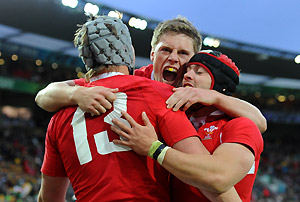
Welsh players celebrate after beating Ireland in the Rugby World Cup (AAP Image/Dave Hunt)
For once the cliche ‘Rugby was the winner’ proved to be a profound piece of wisdom after two pulsating quarter-finals saw Wales defeat Ireland and France beat England, with both teams (and especially Wales) playing vibrant rugby with power in the forwards and pace and skills in the backs.
The defeat of England is especially historic for the future of rugby as a modern sport which rewards teams that try to play with vision and expertise to provide spectators at the ground and watching on television.
In the 21st century, sports have to provide a spectacle if they want to flourish.
England, of all the rugby nations, has mastered rugby as a non-spectacle sport. Winning ugly took precedence over winning with style.
You always had the feeling with England that they had the chants of the Millwall supporters engraved on their hearts: ‘Everyone hates us, we don’t care.’
Stuart Barnes wrote in the Sydney Morning Herald on Saturday morning that he deplored “England’s gritty knack of playing no rugby and winning … The sport needs positivity to triumph this time around.’
The defeat of England, especially, has created the possibility of this outcome.
Wales always win the singing with their fabulous anthem ‘Land of my Fathers’ and on a windy, cold Wellington night they also won their quarter-final against a disappointing Irish side.
The Welsh victory was based on a pack that was good enough to hold a strong Irish pack in the scrums (where Wales had the edge) and the lineouts (where Ireland had the edge).
The Welsh loose forwards, too, outplayed their more famous Irish counterparts by winning several turnovers and penalties at rucks and mauls.
But it was in the backs that Wales had the decisive edge. The big centres Jonathan Davies and Jamie Roberts were too strong and aggressive for their more famous counterparts, the famed Darcy/O’Driscoll combination.
What was also decisive was that Ireland played a really dumb game given that this was knock-out final and that scoring points rather than, say, four tries was the real name of the game.
Wales scored a glorious ensemble play from a kick-off reception when play went up and down the field, across and back, for over three minutes.
Ireland’s pack then asserted a certain dominance. They forced three kickable penalties which Ireland turned down, to the amazement of anyone who had any insight into rugby tactics.
The golden rule of knock-out rugby is take the points. From one of the lineout drives Ireland was held up over the line.
But this was the closest they got to scoring a try from the lineout drives. And all too often throughout the rest of the match they just kicked the ball away to an eager Wales back three who were prepared to run the ball back when this was on.
Later at the end of the match when they were down 24 – 10 Ireland started playing the way they should have throughout the game. They ran hard on to the ball. They put the ball wide. They did not kick the ball away. But they did fail to put enough forwards into crucial rucks and mauls.
You could not help feeling that either Ireland was poorly coached or they failed to carry out the game plan set by the coaching staff.
When a team plays poorly it is sometimes due to the excellence of the opposition. And this is the correct attitude to take on the performance of Wales. I thought at times the Ireland pack was getting on top of the Wales pack. But there is a resilience in the Welsh forwards.
The training in Poland in icy conditions has given them a tough, lean look, even with the front row showing off lean, taut stomachs rather than the usual basketball puku (a Maori word for stomach).
More importantly, Wales had a brilliantly coached backline playing with two lines, one flat and one deep.
The running on to the ball was strong and emphatic. They had runners in motion whenever the ball was gong along the line. And in Mike Phillips, Jonathan Davies, Jamie Roberts and George North they had really big, huge is probably a more accurate word, set of runners.
The former All Black halfback Chris Laidlaw told me earlier in the week that France would beat England because ‘they always play one great game at every World Cup.’
In the pool rounds they had played poorly and lost two matches. They fulfilled Laidlaw’s prediction with a convincing victory over England. They are the only side to lose two pool round matches and still make the semi-final.
France exploited the defensive naivety of Manu Tuilagi by running double-around plays to draw him out of the line and then putting runners into outside gaps.
England tried to move the ball around towards the end of the game. They scored one good try. But Toby Flood missed a crucial conversion. And in the last few minutes England had to score a converted try to get a draw and over-time play.
However, as David Campese said so famously in 1991 when England tried to do the same thing in the final against Australia: ‘You can’t learn to play running rugby in five minutes.’
There was one other interesting aspect to these matches. They were both refereed by southern hemisphere referees who tend to officiate to rewards teams that play positively rather than negatively.
This is a great break-through for this tournament, and for rugby going into the future. Long may it continue, especially in the two other quarter-finals today.































































































